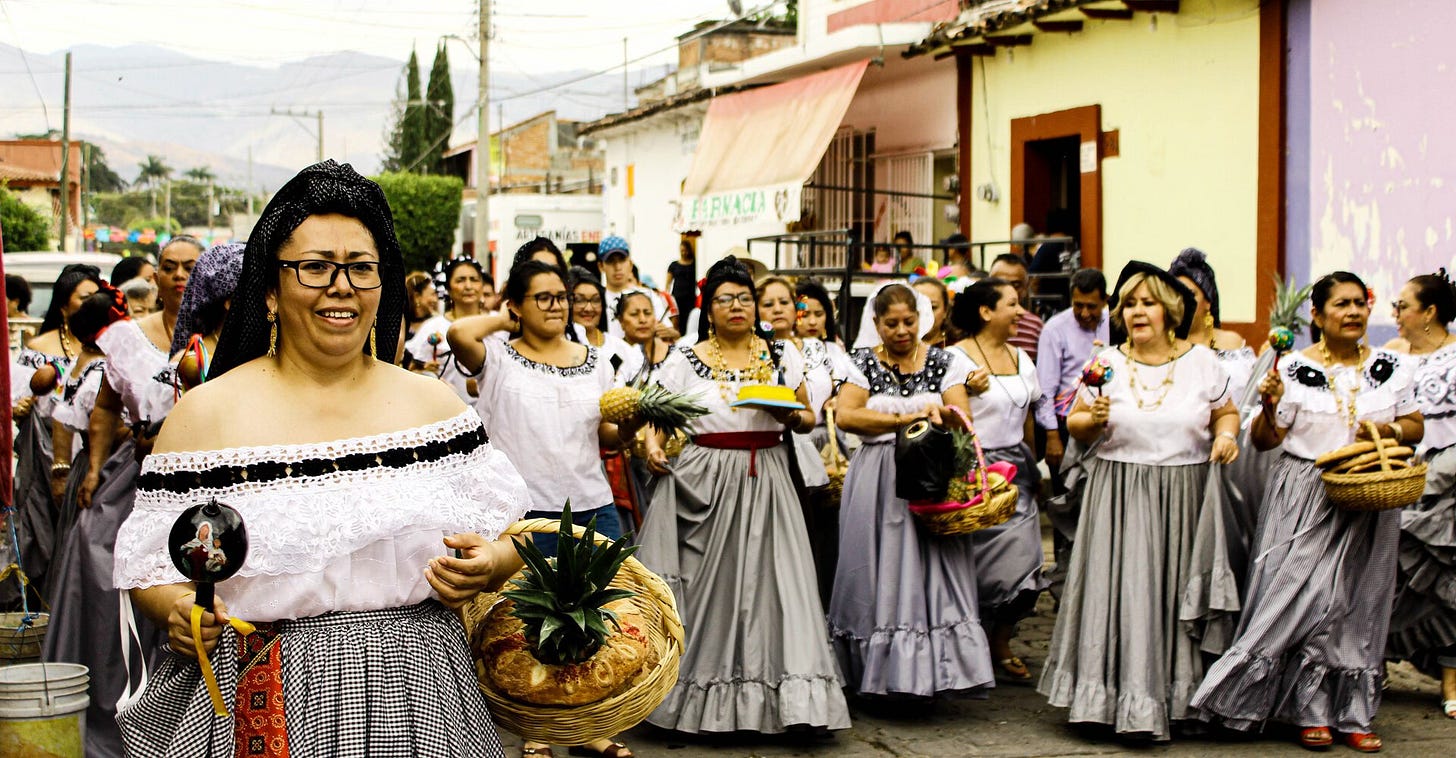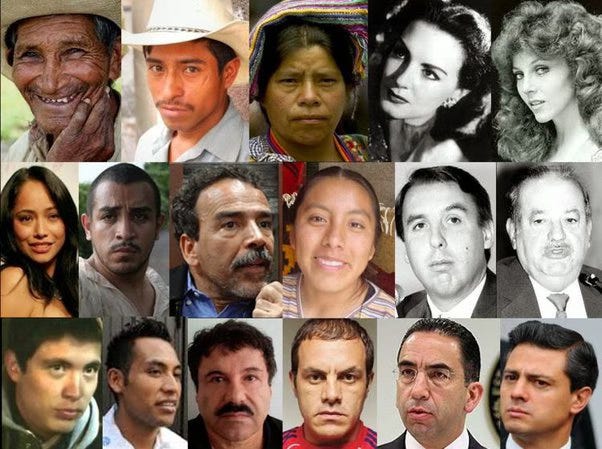Perhaps the biggest reason I love living in Mexico is the kindness and friendliness of the Mexican people. Despite our nations' shared history and occasional unfriendly U.S. government policies, I am often surprised by the lack of hostility I encounter here. In the two years I’ve been living in Mexico, I've never experienced any resentment directed towards me. The warmth and generosity of the Mexican people are likely why no expatriats regrets calling Mexico home.
Mexico is a vibrant cocktail of cultural alchemy and social sorcery. Picture this: a sun-drenched land where hospitality isn't just a nicety but a lifeblood. The secret ingredient is a deep-rooted sense of community, a historical tapestry woven with resilience, and a zest for life that defies the grind of daily existence. It’s a cultural symphony where warmth and friendliness are the leading acts in a never-ending performance of human connection.
In the United States, it’s all about money. In Mexico, the most important thing is family.
Mexican culture highly values family, and this emphasis on close-knit family ties extends to how Mexicans interact with others, creating a sense of warmth and hospitality. Traditions and customs, such as fiestas, community gatherings, and religious events, foster a strong sense of community and encourage social interaction and friendliness from the time they are born. Hospitality is deeply ingrained in Mexican culture, with welcoming and kind behavior toward guests and strangers being a fundamental value.
Mexicans often engage in warm and lively social interactions, with common greetings involving a hug or a kiss on the cheek and animated, friendly conversations. Despite economic and social challenges, many Mexicans maintain a positive outlook on life, which translates into a friendly and warm demeanor. Respect for others, including elders, friends, and even strangers, is also emphasized, manifesting in polite and friendly behavior.
When I walk down the streets of Guanajuato, a small city, most people acknowledge me, and I do the same. We smile and exchange greetings. In contrast, smiling at a stranger on an American street in many cities often prompts a wary response: "What does this person want from me?"
These cultural traits create an environment where warmth and friendliness are not only expected but are also integral parts of social interactions.
Living in such a loving and supportive community of Mexicans and American immigrants has greatly improved the quality of my life. Before I moved to Guanajuato, I spent nearly two decades in Tucson, Arizona. I don't like generalizations, so I won't say that everyone in Arizona was a gun-toting bigot who hated Jews. But even living in a university town, a blue oasis in a red state, I still found the people, at least those I encountered to be kind of cold, to be less than friendly. The polarization of America intensified during my time in Tucson, leading me to believe that many Americans today are quite suspicious of anyone outside their immediate circle of friends.
I can't say Mexicans are universally welcoming, but nearly everyone I've encountered in Guanajuato and Mexico City has been incredibly friendly.
About five years ago, while walking my dog in Tucson, I fell in the street. It wasn't serious—I had just tripped over something and needed a moment to collect myself. Several people and cars passed by without stopping. The same thing happened when I first moved to Guanajuato. After I fell, a small crowd gathered, eager to help. A couple of shop owners even came out of their stores, concerned about me, a total stranger and a gringo no less.
What about the cartels? Yes, they're present, but I haven't experienced anything related to them. Just like anywhere else, there are safe areas and places to avoid, which is easy to manage here. Another myth is police shakedowns, especially during traffic stops. Again, this hasn't been my experience.
One more thing before I continue: before I moved here, several people warned me about the quality of medical care. That is total nonsense. I had a life-and-death heart-related emergency a couple of months ago. I quickly found a world-class heart surgeon and can happily report that the man was a miracle worker. My experience with medical care in Mexico has been overwhelmingly positive. Like anyplace else, it’s a matter of finding the right doctor or health professional. What’s really different in that health care costs considerably less here, especially for dental work, and Big Pharma doesn't dominate. You can go to a pharmacy and buy most prescription medicines for a fraction of the price in America without a prescription.
Is there anything I don’t like? Yes, the bureaucracy. Trying to get anything done, whether it’s opening a bank account or getting a driver’s license, requires the patience of a saint. The rhythm of life here beats to a different drum, one that demands a shift in expectations. Some first-world folks find it maddening. Americans, in particular, always seem to be in a rush, wanting everything yesterday. But here? The pace is slower. Nothing happens quickly. It’s just a fact of life.
And forget about waltzing into a grocery store to choose from fifty thousand items. In the bigger cities, you might find places similar to Trader Joe’s or Whole Foods, but they’re not everywhere. So, you adjust. Not a big deal for me. Whatever I can’t find in the store, I just order from Amazon. Problem solved.
In a smaller city like Guanajuato, the cuisine is generally excellent, ranging from street food to gourmet offerings. Many Americans mistakenly equate Mexican food with Taco Bell, but the reality is vastly different. Although tacos are the national dish, the food here varies greatly depending on the location. It’s a big country so the local food can be quite different from another part of the country.
In smaller cities, it can be challenging to find ethnic food. While Mexico City offers a truly international culinary scene, finding good Chinese food where I live is impossible. As a Jew who grew up enjoying Chinese food and had countless great meals in Manhattan’s Chinatown, I miss it dearly, along with the delis. I have yet to find anything approaching a New York bagel here.
The Japanese food is decent, but still not something I would eat regularly. However, there's a Japanese grocery store in León, about forty-five minutes from where I live. This store exists because of the Nissan factory in the area, which has Japanese management who need a place to shop. I love natto, the fermented soybeans popular in Japan but largely unknown in the U.S. So, I visit this store every two weeks to stock up on natto, udon, real ramen, and Japanese sauces and spices.
Learning Spanish has been my only real challenge living here. I took Spanish in high school but never used it much afterward. Before moving here, I thought it would take three to five years to become fluent. That myth was quickly dispelled upon my arrival. Mastering a new language doesn't happen overnight. Now, I estimate it will take me eight to ten years to build the vocabulary needed for the deep conversations I enjoy. Here, they say "poco a poco," meaning "little by little." In many ways, learning Spanish is similar to learning a musical instrument. It requires daily practice; you can't just cram it all into your brain at once. Plus, I realize that my brain isn't what it used to be, especially now that I'm on the wrong side of seventy. My memory just isn't as sharp as it once was.
Nevertheless, two years in, I can have simple conversations with people. Because my vocabulary is limited, I frequently have to simplify my thoughts. I love speaking with Mexicans, most of whom don’t speak English. It’s obvious they appreciate that I’m trying, as there are some Americans who live here and never learn Spanish. I live in a foreign country when you can’t really speak to the people? For me, conversations with Mexicans are extremely rewarding.
Last night at my favorite street taco stand, I spoke with everyone ordering and waiting for their food, just a couple of sentences each. When I speak with them, I look deeply into their eyes and pick up on something, like their children, and compliment them on how beautiful they are. I can feel their hearts opening when I do this. At parties, I immediately go to the kitchen to speak with the women cooking the food and thank them. At the taco stand, after getting my food, I walk around to the back of the stand to thank the elderly woman whose food is so delicious.
The other day, I needed my shoes shined and stopped at the Jardín, a tree filled plaza in the center of town where many people gather, including the shoeshiners. At first, the man I chose didn’t speak. But that didn’t stop me. I asked him how long he had been shining shoes. Fifty-five years at this one spot! I then said, in Spanish, fifty-five years without stopping? You must be very tired. He laughed, and I could feel his heart opening. After he finished, I paid him, I said “Hasta pronto,” meaning I’ll see you soon. “Eso espero,” he said, I hope so.
I do this all the time. I make it a point to speak with as many people as possible every day. I try to touch the heart and soul of everyone I meet. That is how I live my life. This what matters.






Exactamente!
I saw a video about Guanajuato and the people were in a huge field smacking bags of gunpowder with long handled hammers. It's nuts!